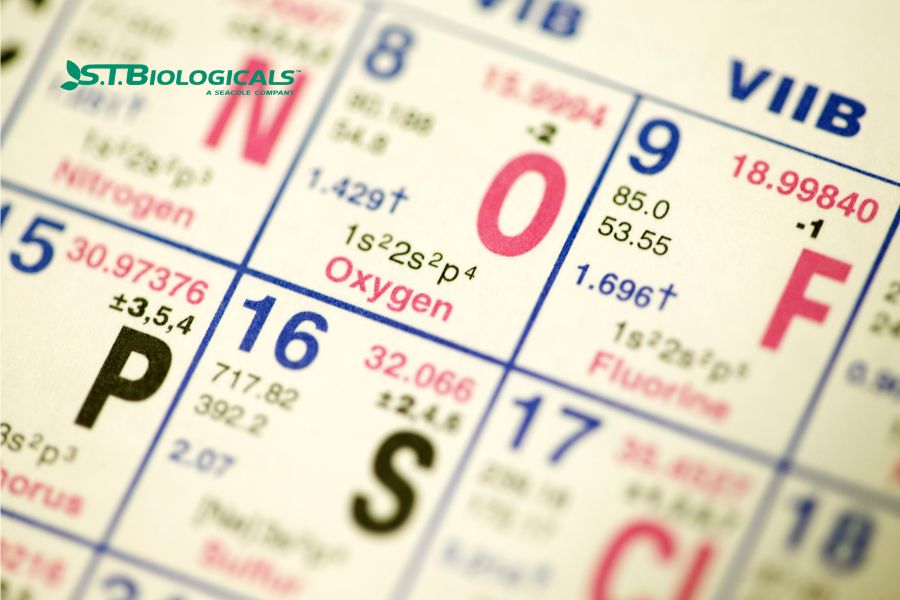
This month, we’ve partnered with the regenerative agriculture experts at ST Biologicals to learn about the impact micronutrients have on plant health. You can learn more about ST Biologicals on their website or by following them on LinkedIn.
Micronutrients are essential elements that plants require in small amounts for their overall health. In the context of plant health, micronutrients refer to nutrients like iron, zinc, manganese, copper, and boron that play a crucial role in various plant functions. These elements are vital for proper growth, development, and overall plant vigor.
Macronutrients and Micronutrients
There really isn’t any competition or versus. Both are needed for optimum plant health. In combination, they are the building blocks of plant and soil health.
Macronutrients and micronutrients are two different classifications of nutrients that are required by plants. Macronutrients, including nitrogen, phosphorus, and potassium, are needed in larger quantities compared to micronutrients. They are mainly responsible for providing energy, promoting growth, and supporting overall plant structure. On the other hand, micronutrients are required in smaller amounts but are equally essential for various metabolic functions within the plant.
Too much, or too little, of a micronutrient impacts the ability of plants to uptake macronutrients. There are complex cross-talks between the micro and macro elements within the plant.
Scientists from multiple disciplines study what is referred to as ionomic composition. The “mineral nutrient and trace-element composition of a living organism.” (1)
As producers, we need to be aware of the complexity of plant systems. All nutrients are essential, some just in greater amounts than others. Trace elements are key to optimum crop production.
Common Micronutrients Needed for Crop Health
Crop health is directly tied to livestock and human health. Deficiencies in crops of trace elements such as copper (Cu), zinc (Zn), iron (Fe), and manganese (Mn) can lead to anemia, decreased immunity, or slow growth. So, whether you’re feeding livestock or humans, fertilization that includes micronutrients leads to higher nutrient profiles in your crops. If you’re feeding cattle, that translates into faster weight gain.
Iron – Essential for Photosynthesis
Iron is the fourth-most abundant element on Earth, but it’s often found in a form not available for plant nutrient intake. Iron is essential for chlorophyll formation, which plays a central role in photosynthesis. Iron is also involved in plant respiration and oxygen transportation within the plant.
Zinc – Necessary for High Yields
Zinc is crucial for enzyme function and hormone regulation. It aids in the synthesis of proteins and DNA. Although very small amounts are needed, the growth and development of crops stop without the enzymes made available by zinc. Plants can handle more cold weather with the proper amount of zinc.
Manganese – Coefficient of Enzyme Activation
Manganese is necessary for photosynthesis and nitrogen metabolism. A deficiency in manganese may show up as nitrogen deficiency because of how closely micro and macronutrients are bound. It also helps in the activation of enzymes required for various plant functions.
Copper – for Strong Plant Immune Systems
Copper is involved in plant metabolic processes and plays a prominent role in disease resistance. It is necessary for the formation of lignin, an important component of cell walls.
Boron – for Strong Cell Membranes
Boron is critical for proper cell wall formation and reproductive development. It is essential for the production of plant hormones and the transport of sugars.
Signs of Micronutrient Deficiencies in Plants
Visual symptoms of micronutrient deficiencies can vary, but common signs include yellowing or chlorosis of leaves, stunted growth, poor fruit development, and limited root growth. These deficiencies can impact overall plant health and productivity, leading to decreased yields and lower resistance to pests and diseases. Troubleshooting by walking your fields can uncover any micronutrient malnutrition in your fields.
SOURCES


